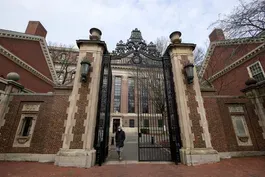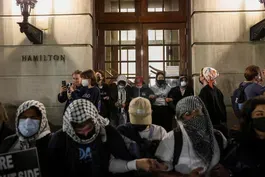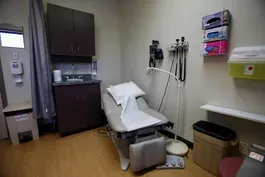
News Wrap: Iran leader downplays chance of nuclear deal
Clip: 4/15/2025 | 4m 58sVideo has Closed Captions
News Wrap: Iran's supreme leader downplays chance of deal from nuclear talks with U.S.
In our news wrap Tuesday, Iran's supreme leader said nuclear talks with the U.S. were "taken well" but downplayed prospects for a deal, Russia said negotiations with the U.S. were "constructive" but wouldn't give a timetable for peace in Ukraine, the CDC says nearly one in 31 U.S. children has autism and Arkansas and Indiana moved to ban soda and candy from food stamp programs.
Problems with Closed Captions? Closed Captioning Feedback
Problems with Closed Captions? Closed Captioning Feedback
Major corporate funding for the PBS News Hour is provided by BDO, BNSF, Consumer Cellular, American Cruise Lines, and Raymond James. Funding for the PBS NewsHour Weekend is provided by...

News Wrap: Iran leader downplays chance of nuclear deal
Clip: 4/15/2025 | 4m 58sVideo has Closed Captions
In our news wrap Tuesday, Iran's supreme leader said nuclear talks with the U.S. were "taken well" but downplayed prospects for a deal, Russia said negotiations with the U.S. were "constructive" but wouldn't give a timetable for peace in Ukraine, the CDC says nearly one in 31 U.S. children has autism and Arkansas and Indiana moved to ban soda and candy from food stamp programs.
Problems with Closed Captions? Closed Captioning Feedback
How to Watch PBS News Hour
PBS News Hour is available to stream on pbs.org and the free PBS App, available on iPhone, Apple TV, Android TV, Android smartphones, Amazon Fire TV, Amazon Fire Tablet, Roku, Samsung Smart TV, and Vizio.
Providing Support for PBS.org
Learn Moreabout PBS online sponsorshipWILLIAM BRANGHAM: In the day's other headlines: Iran's supreme leader said initial talks with the U.S. over his country's rapidly developing nuclear program were taken well.
But he downplayed prospects for a deal.
In his first comment since negotiators met last Saturday, Ayatollah Ali Khamenei said he's neither overly optimistic nor overly pessimistic about the new dialogue.
Meanwhile, the Trump administration has walked back comments that suggested a willingness to allow Tehran to enrich uranium at a low level.
U.S. special envoy Steve Witkoff made that suggestion last night on FOX News.
STEVE WITKOFF, U.S. Special Envoy to the Middle East: This is going to be much about verification on the enrichment program, and then ultimately verification on weaponization.
We're here to see if we can solve this situation diplomatically and with dialogue.
WILLIAM BRANGHAM: Taking to social media today, Witkoff called on Iran to dismantle its nuclear program altogether.
The next round of talks is expected this weekend, either in Rome, as U.S. officials initially indicated, or in Oman, where last week's meetings took place.
Russia today said that recent talks with the U.S. were constructive, but they wouldn't give any sort of timetable for a peace agreement on Ukraine.
Kremlin spokesman Dmitry Peskov told reporters that: "There is -- there are no clear outlines, but there is a political will to move towards this agreement."
Kyiv and some of its European allies have accused Moscow of dragging out talks because it's not serious about wanting to end the war.
Today, NATO Secretary-General Mark Rutte visited wounded soldiers in Ukraine with President Volodymyr Zelenskyy.
He indicated a willingness to give the discussions time to progress.
MARK RUTTE, NATO Secretary-General: These discussions are not easy, not least in the wake of this horrific violence.
But we all support President Trump's push for peace.
Other allies, including through efforts led by France and the United Kingdom, are ready, willing, and able to shoulder more responsibility in helping to secure peace when the time comes.
WILLIAM BRANGHAM: Meantime, Russian authorities say a barrage of Ukrainian drones hit homes and buildings in its cursed border region.
One person was killed.
Nine more were hurt.
It comes days after a devastating Russian attack on Ukraine's Sumy region that killed dozens.
New data from the CDC shows nearly one in 31 children in the U.S. has autism.
That's up from the last count in 2020 that showed one in 36 children suffered from the disorder.
The data shows boys are diagnosed at a higher rate than girls, and it's more common among children of color.
The report said the recent increase was likely due to better screening and awareness.
The causes of autism are still unknown, but ample studies have ruled out childhood vaccines as a factor.
Also on public health, both Arkansas and Indiana have moved to ban soda and candy from the food stamp programs in their states.
They're the first to ask the Trump administration to remove those items from SNAP, which helps low-income Americans pay for groceries.
Indiana's Republican governor made his state's announcement alongside Dr. Mehmet Oz, who heads the Centers for Medicare and Medicaid Services, as well as Trump's health secretary, Robert F. Kennedy, Jr. GOV.
MIKE BRAUN (R-IN): More snap money is spent on sugar drinks and candy than on fruits and vegetables.
That changes today.
ROBERT F. KENNEDY JR., U.S. Health and Human Services Secretary: We need to change our food system in those countries, so that we start giving our kids foods that are going to actually make them healthy and imbue them with vigor and ambition and a dream.
WILLIAM BRANGHAM: The Department of Agriculture, which oversees SNAP, says it is fast-tracking the state's requests.
Candy and beverage companies called the approach misguided.
And it was a down day on Wall Street, but without any tariff bombshells, it kept market movements moderate.
The Dow Jones industrial average lost just over 150 points, while the Nasdaq had a negligible loss of just eight points.
The S&P 500 followed suit, also down by less than 10.
Still to come on the "News Hour": the plight of hundreds of thousands of Sudanese refugees who have fled to neighboring Chad; why abortions are rising in the U.S. despite more restrictions; plus much more.
China cuts exports of rare earth minerals amid trade war
Video has Closed Captions
Clip: 4/15/2025 | 7m 37s | China cuts exports of vital rare earth minerals as trade war with U.S. intensifies (7m 37s)
Grants frozen as Harvard pushes back against Trump's demands
Video has Closed Captions
Clip: 4/15/2025 | 6m 41s | Billions in grants frozen after Harvard pushes back against Trump's demands (6m 41s)
How college communities are reacting to funding threats
Video has Closed Captions
Clip: 4/15/2025 | 5m 34s | How college communities are reacting to funding threats, international student arrests (5m 34s)
Inside the camp where Sudanese refugees have fled civil war
Video has Closed Captions
Clip: 4/15/2025 | 9m 57s | Inside the crowded camp where Sudanese refugees have fled violence and hunger (9m 57s)
Judge presses DOJ on wrongfully deported man
Video has Closed Captions
Clip: 4/15/2025 | 8m 54s | Judge presses Trump administration on why it hasn't returned wrongfully deported man (8m 54s)
Why abortions are rising in U.S. despite more restrictions
Video has Closed Captions
Clip: 4/15/2025 | 7m 11s | Why abortions are rising in the U.S. despite more restrictions (7m 11s)
Providing Support for PBS.org
Learn Moreabout PBS online sponsorshipSupport for PBS provided by:
Major corporate funding for the PBS News Hour is provided by BDO, BNSF, Consumer Cellular, American Cruise Lines, and Raymond James. Funding for the PBS NewsHour Weekend is provided by...
















